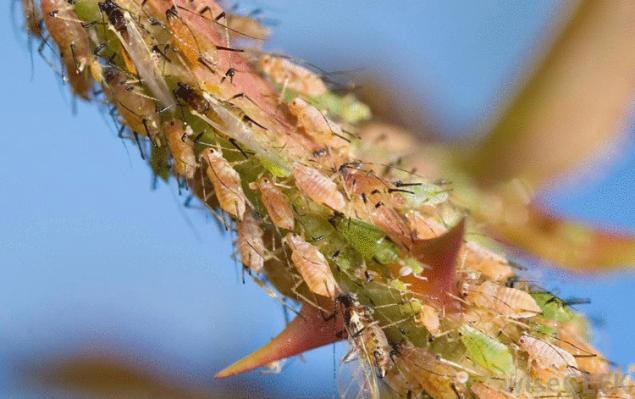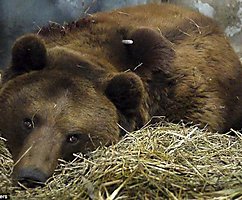For control of aphids plants use bacteria traitors
 Bashny.Net
Bashny.Net
Symbiotic bacteria of aphids secrete a protein that the saliva of the insect enters the plant and runs in this protective system against pests.
Known aphid symbiosis with ants: in exchange for a sweet selection of aphids the ants take these delicate insects under his wing. It would seem that ant protection of aphids can suck plant juices, without fear of enemies. However plants are able, without assistance, to respond to the invasion of aphids – the only problem is to identify the pest.

In the bodies of aphids live special symbiotic bacteria of the genus Buchnera, and they live in the intestine and in gemocele, a body cavity, which develops from the blood vessels and filled with blood. Without bacterial symbionts of insects poorly reproduce themselves Buchnera cannot live outside the body of the aphid. Symbiosis this could be perfect in all respects, if the microbes did not betray their masters. But, most of all, bacteria do so unintentionally: they just emit a protein that gets into the saliva of aphids, and thence into the plant. Bacterial protein allows the plant to know that it settled pests.
It was discovered by the researchers from University of California-riverside analyzed the protein composition of saliva large potato aphids Macrosiphum euphorbiae. Insects for the experiment took 100 000, which is not surprising considering their size. Using mass spectrometry was able to identify 105 proteins, some of which belonged to the aphids, while others live in these bacteria Buchnera. And here is one of the bacterial proteins, Co, was an alarm for the plant protection systems.
Curiously, this same Co, as was shown earlier, is the stimulus for the immune system of animals. Thus, anti-infective system of plants and animals activated in the presence of the same molecules. Among the bacteria Co operates in conjunction with protein chaperones whose job it is to fix incorrect spatial stacking other proteins and thus to ensure their proper functioning.
However, plants use Co not to fight with microbes, but in order to get rid of aphids: in response to bacterial protein in plants are activated genes and metabolic reactions, which are literally poison the insect life. The results were published in the journal Proceedings of the National Academy of Sciences.
According to the authors, the bacteria Buchnera and the like are not only in aphids. Obviously, the bacterial microflora in General plays a big role in the relationship between plants and their hosts. I own aphid saliva has proteins, clearly intended for export, for influencing the metabolism of plants, so the researchers have to work on figuring out the molecular details of cohabitation insects, bacteria and plants.
Exactly how a protein interacts with plant Co protection system, the authors do not know, but want to find out in the near future – they have already started to look for a receptor on the plant cells, which could join Co. If you manage to decipher the involved molecular mechanism, it is not excluded that soon we will be able using bacteria to get rid of pests on crops.
Source: nkj.ru
Known aphid symbiosis with ants: in exchange for a sweet selection of aphids the ants take these delicate insects under his wing. It would seem that ant protection of aphids can suck plant juices, without fear of enemies. However plants are able, without assistance, to respond to the invasion of aphids – the only problem is to identify the pest.

In the bodies of aphids live special symbiotic bacteria of the genus Buchnera, and they live in the intestine and in gemocele, a body cavity, which develops from the blood vessels and filled with blood. Without bacterial symbionts of insects poorly reproduce themselves Buchnera cannot live outside the body of the aphid. Symbiosis this could be perfect in all respects, if the microbes did not betray their masters. But, most of all, bacteria do so unintentionally: they just emit a protein that gets into the saliva of aphids, and thence into the plant. Bacterial protein allows the plant to know that it settled pests.
It was discovered by the researchers from University of California-riverside analyzed the protein composition of saliva large potato aphids Macrosiphum euphorbiae. Insects for the experiment took 100 000, which is not surprising considering their size. Using mass spectrometry was able to identify 105 proteins, some of which belonged to the aphids, while others live in these bacteria Buchnera. And here is one of the bacterial proteins, Co, was an alarm for the plant protection systems.
Curiously, this same Co, as was shown earlier, is the stimulus for the immune system of animals. Thus, anti-infective system of plants and animals activated in the presence of the same molecules. Among the bacteria Co operates in conjunction with protein chaperones whose job it is to fix incorrect spatial stacking other proteins and thus to ensure their proper functioning.
However, plants use Co not to fight with microbes, but in order to get rid of aphids: in response to bacterial protein in plants are activated genes and metabolic reactions, which are literally poison the insect life. The results were published in the journal Proceedings of the National Academy of Sciences.
According to the authors, the bacteria Buchnera and the like are not only in aphids. Obviously, the bacterial microflora in General plays a big role in the relationship between plants and their hosts. I own aphid saliva has proteins, clearly intended for export, for influencing the metabolism of plants, so the researchers have to work on figuring out the molecular details of cohabitation insects, bacteria and plants.
Exactly how a protein interacts with plant Co protection system, the authors do not know, but want to find out in the near future – they have already started to look for a receptor on the plant cells, which could join Co. If you manage to decipher the involved molecular mechanism, it is not excluded that soon we will be able using bacteria to get rid of pests on crops.
Source: nkj.ru
Tags
See also
Presented hybrid trains and aircraft to combat congestion
IBM launches humanitarian initiatives to combat Ebola
Law on organic production on the way
The law on organic production is on the way
The best traditional recipes to combat varicose veins
Folk remedies for mosquito control
3 effective treatments to combat cellulite
That's what secret tempting berry! You're not going to buy this after seeing it under the microscope...

















